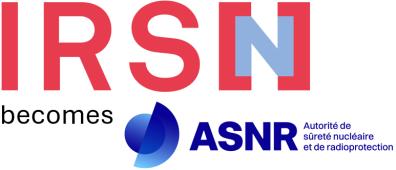INWORKS epidemiological study: new results on the risk of leukemia, lymphoma and multiple myeloma among nuclear industry workers
New results from the INWORKS epidemiological study published on August 31, 2024 confirm the existence of a relationship between leukemia risk and cumulative exposure to low doses of ionizing radiation.
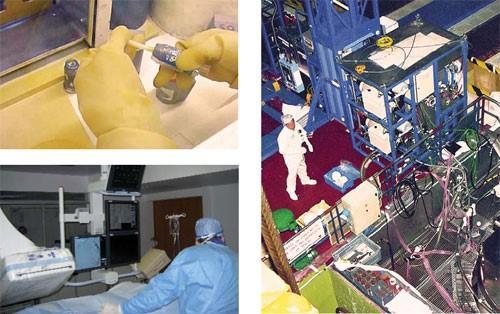
Workers subject to dosimetric monitoring (ou) Dosimetrically monitored workers
INWORKS is an international epidemiological study of mortality among nuclear industry workers. It is a large-scale epidemiological study designed to quantify the health risks potentially associated with repeated exposure to low doses of ionizing radiation. Its aim is to verify the validity of the assumptions underlying the current radiation protection system, which is based in particular on an extrapolation of knowledge of radiation-induced risks drawn from the epidemiological follow-up of survivors of the Hiroshima and Nagasaki bombings. IRSN has been an active contributor to the INWORKS study since its inception.
INWORKS brings together cohorts of French, American, and British workers employed in the nuclear industry (fuel preparation, research, power generation, spent fuel reprocessing) and monitored for external exposure to ionizing radiation by personal dosimeters. The study population includes over 300,000 male and female workers employed from the mid-1940s onwards. The French cohort, led by IRSN, includes over 59,000 workers from CEA, EDF, and Orano.
New research results recently published on the website of the journal “The Lancet Haematology” show that the risk of death from leukemia (excluding chronic lymphocytic leukemia, considered to be non-radiation-induced) increases in proportion to the dose accumulated by the workers over the course of their working careers. They also confirm that risks are low at low doses.
These results reinforce our knowledge of the effect of protracted exposure to low doses of ionizing radiation, and therefore constitute an important addition to the consolidation of the assumptions underlying the radiation protection system. In particular, they support the justification for radiological protection of populations exposed to low doses of ionizing radiation (nuclear industry workers, medical staff, diagnostic medical exposure, etc.).
Read the IRSN information note on the new INWORKS results (PDF)
Read the publication in The Lancet Haematology
Previous information notes
- October 3, 2023: Publication of new results from the INWORKS epidemiological study on cancer risk in nuclear industry workers (PDF)
- October 21, 2015: Publication of new results from the INWORKS epidemiological study on cancer risk in nuclear industry workers chronically exposed to low doses of ionizing radiation (PDF)
- June 23, 2015: Publication of the first results of the INWORKS epidemiological study on the risk of leukemia and lymphoma in nuclear industry workers chronically exposed to low doses of ionizing radiation (PDF)
Everything you need to know about Radiobiology: follow the guide!
The result of collaboration between 126 international experts, including 9 from IRSN, the Guide to Radiobiology is now available from Springer. This freely accessible work offers a comprehensive perspective on radiobiology and related disciplines.
Initiated during the covid-19 pandemic, this guide focuses on various aspects of radiobiology. Its aim is to provide a better understanding of the effects of exposure to ionising radiation at the cellular and molecular levels, thereby assessing their impact on health.
A comprehensive, educational tool
Aimed at a wide audience, this guide is positioned as an essential learning resource, providing a solid foundation for students, scientists and medical staff interested in radiobiology. As a teaching tool, it is accompanied by educational material designed to facilitate understanding of the complex concepts involved in this constantly evolving discipline.
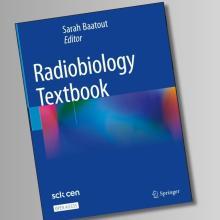
Through its 12 chapters, this handbook aims to cover the sub-disciplines involved in radiobiology such as radiophysics, radiation oncology, radiotherapy, radiochemistry, radiopharmacy, nuclear medicine, space radiation biology and physics, environmental and human radiation protection, nuclear emergency planning, molecular biology, bioinformatics, as well as the ethical, legal and social considerations related to radiobiology. The chapters of this handbook are designed to be entirely independent of each other and can therefore be read in any order.
IRSN experts were involved in the writing of this guide on the chapters dedicated to the molecular biology of radiation, dosimetry and radiotherapy, with the participation of Olivier Guipaud, Agnès François, Alexendra Semont, Mallia Geiger and Fabien Milliat from LRMed, Carmen Villagrasa and Yann Perrot from LDRI and Sandrine Frelon from LECO.
IRSN and ICRP renew their collaboration agreement
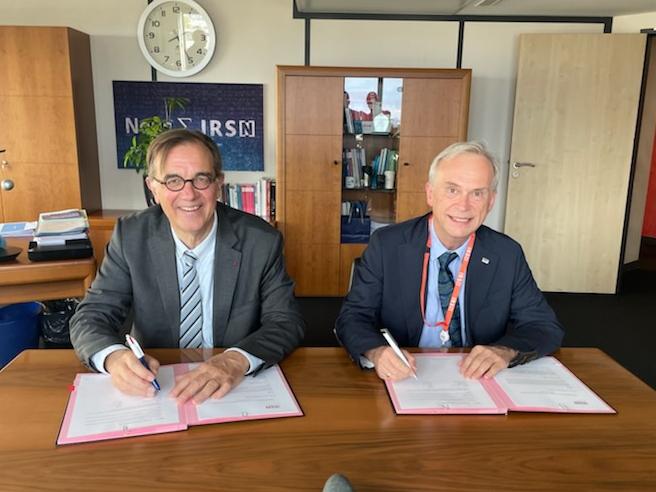
The extension to the collaboration agreement signed by Jean-Christophe Niel and Werner Rühm, President of the ICPR.
IRSN and the ICRP (International Commission on Radiological Protection) have just signed a new collaboration agreement for the next two years.
The ICRP is an international organization that drafts and publishes recommendations aimed at improving the radiation protection of people (the public, workers, patients) and the environment, in all its dimensions (dosimetry, health risk assessment, etc.). These recommendations are mainly based on the most recent research findings, and represent an important foundation on which the vast majority of national and international radiation protection regulations are based.
Since its creation, IRSN has played an active role in the ICRP's discussions and recommendations. Seven of the Institute's experts currently sit on the ICRP's main commission and 4 technical committees, in addition to numerous thematic working groups.
To coincide with the visit to France of members of the ICRP's Main Commission, a seminar will be held tomorrow in Fontenay-aux-Roses to discuss the future of radiation protection (see information below). Indeed, after the publication of the document Keeping the ICRP recommendations fit for purpose in 2021 (below the French version translated in 2022 by IRSN), the ICRP is committed to a review and revision of the radiological protection system, culminating in the updating of the general recommendations published in 2007 (ICRP publication 103).
Workshop on the Future of Radiological Protection
Open to all, registration required (face-to-face and online)
March 19, 2024 - 9:00 am to 3:30 pm
IRSN Auditorium in Fontenay-aux-Roses or online
Consult the french version of the ICRP publication: Maintenir les recommandations de la CIPR adaptées aux besoins (2022)
Find out more
On the development of standards and the Institute's contribution, read the dossier (p.8-13) in Repères (FR)
Fight against cancer: IRSN recognised by the IAEA as a Collaborating Centre
On 1 February 2024, the Director General signed an agreement with the IAEA in Vienna recognising IRSN as a Collaborating Centre in the fight against cancer. This Centre is part of the IAEA's Rays of Hope initiative. It aims to promote the safe use of ionising radiation (IR) in the medical field for the diagnosis and treatment of cancer (radiotherapy), particularly in emerging countries.
This agreement commits IRSN for three years (2024-2027). It will mobilise around twenty experts from the Institute in four areas:
- support for awareness-raising and training in the use of IR in the medical field
- assistance in drafting IAEA guides
- research into radiation protection and medical physics
- risk perception and communication on the risks associated with the use of IR in the medical field
This commitment is a further contribution by IRSN to the IAEA and the fight against cancer.
Following IRSN's designation as an IAEA Collaborating Centre (ICC) in 2021, in the field of medical management of radiological and nuclear emergencies, this new agreement represents further recognition of IRSN's expertise on the international scene and an additional contribution by IRSN to the IAEA's work in the fight against cancer.
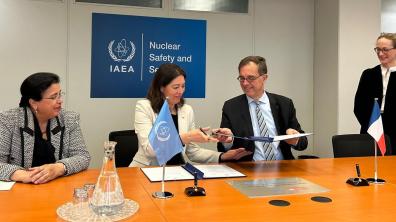
For more information
2023: a great year for the Pianoforte Partnership coordinated by IRSN
Launched in June 2022 as part of EU research and innovation framework program Horizon Europe/EURATOM, the European research partnership Pianoforte aims to improve knowledge and promote innovation in the field of radiation protection on behalf of better protection of the public, patients, workers and the environment in all scenarios of exposure to ionizing radiation.
Coordinated by IRSN, the Pianoforte partnership brings together 58 partners representing 22 countries of the European Union as well as the United Kingdom and Norway.
The year 2023 saw the first major milestone of the partnership with the launch of Pianoforte's 1st open call for proposals, focused on three main topics:
- Topic 1: Developing a knowledge base for a better understanding of disease pathogenesis of ionising radiation-induced cancer to improve risk assessment.
- Topic 2: Individualised diagnostic as well as therapeutic procedures with regard to optimisation of the benefit/risk ratio.
- Topic 3: Development of risk assessment and risk management approaches and technological capabilities to cope with scenarios arising from threats due to war or armed conflicts situations or natural disasters taking into consideration social, ethical, and legal issues.
24 research project proposals were received for the call, representing more than 100 different organizations. After an evaluation process by a review panel of international experts, the 9 winning projects were approved on December 6th, 2023, and presented during a meeting held in Budapest (Hungary). Throughout the duration of the projects, IRSN will work alongside the coordinators of the selected projects to provide them with the assistance they need to ensure that they run smoothly.
Finally, the coming year promises to be a busy one, with the launch of the second call for projects at the end of the first quarter of 2024. IRSN, in its role as coordinator and drawing on the experience gained from the first call for tenders, will be on hand to make this one a success.
More information
IRSN, a collaborating centre, visits the WHO in Geneva
On Tuesday, December 19, 2023, an IRSN delegation led by Director General Jean-Christophe Niel travelled to Geneva (Switzerland) for talks with the World Health Organization (WHO).
As a WHO collaborating centre, IRSN presented an overview of its activities in support of the WHO. These activities focus on the following 4 areas:
- nuclear accidents and radiological crises
- mental health (indirect health impact of exposure to ionising radiation)
- medical applications of ionising radiation
- assessment of the risks associated with exposure to ionising radiation
For its part, the WHO presented the forthcoming actions it plans to carry out in these 4 areas, for which IRSN is expected to provide support.
The meeting was followed by a visit to the WHO crisis centre. Among other things, it provided an overview of the WHO's health response to the war in Ukraine.
IRSN, a collaborating centre since 2010, wishes to pursue this relationship with the WHO to continue to contribute to the advancement of radiation protection, provide technical support in the event of a radiological or nuclear emergency, and share knowledge about the medical and health consequences of radiological and nuclear risks.
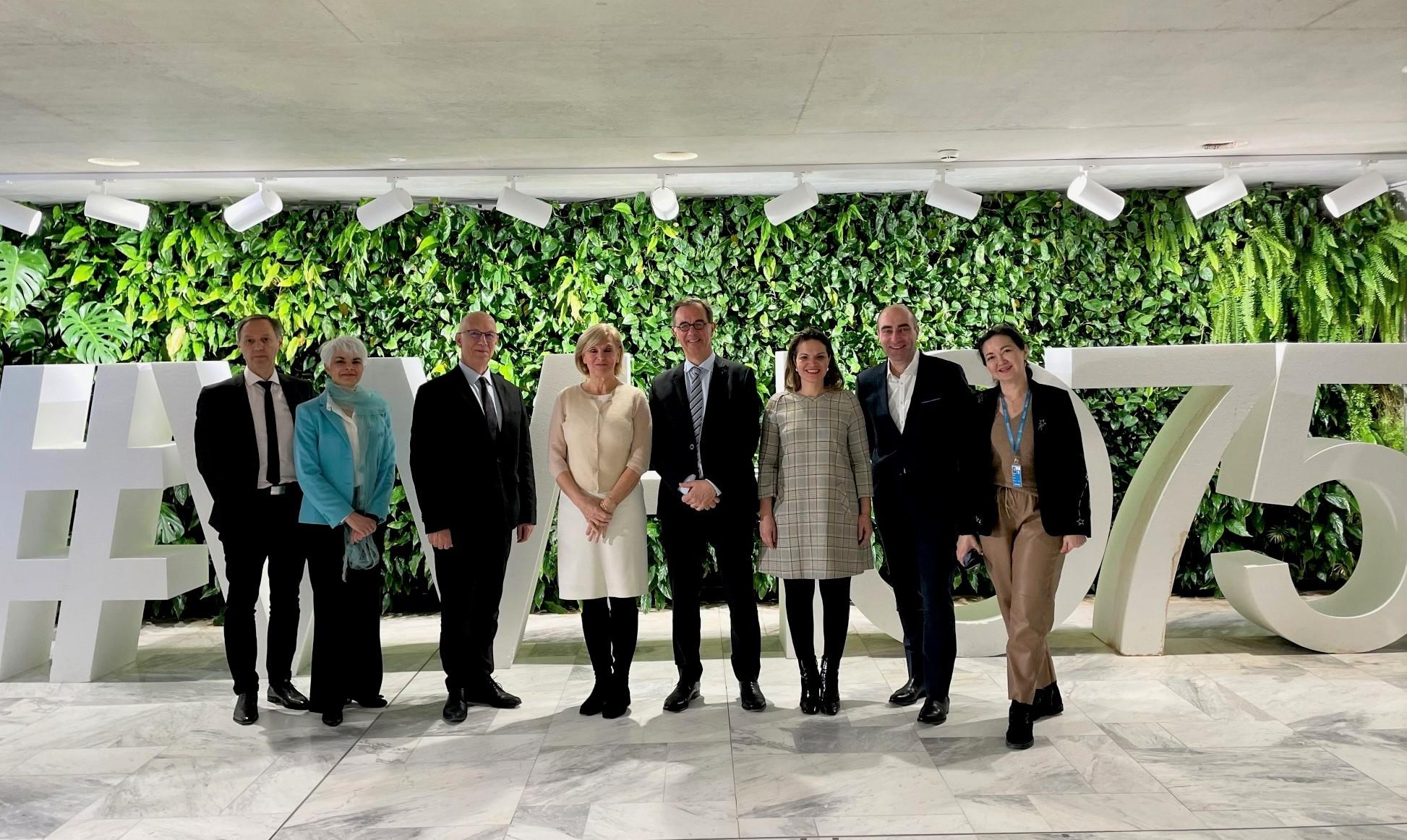
From left to right : Robert Dallendre, Émilie Van Deventer (OMS), Jean-Christophe Gariel, Maria Neira (OMS), Jean-Christophe Niel, Radia Tamarat, Marc Benderitter, Zhanat Carr (OMS)
